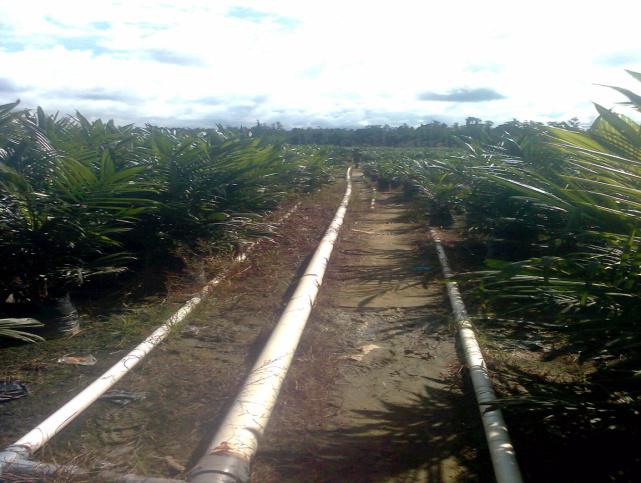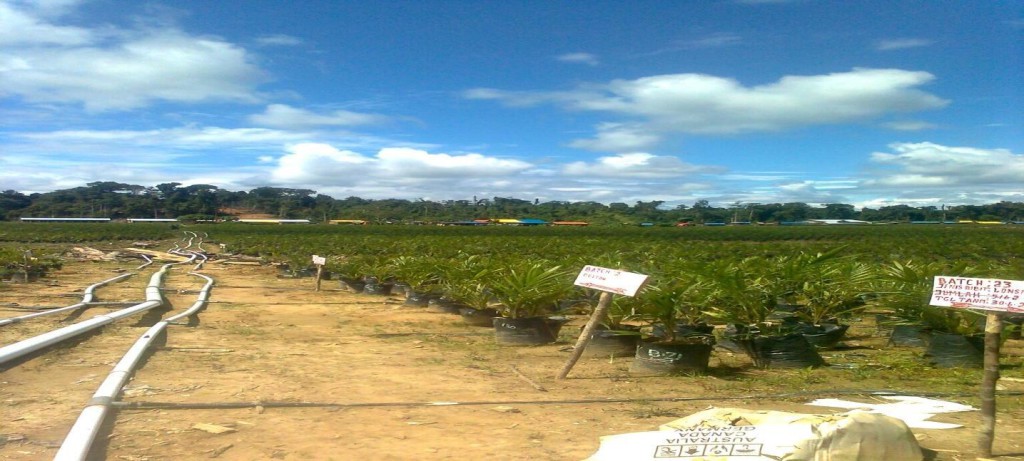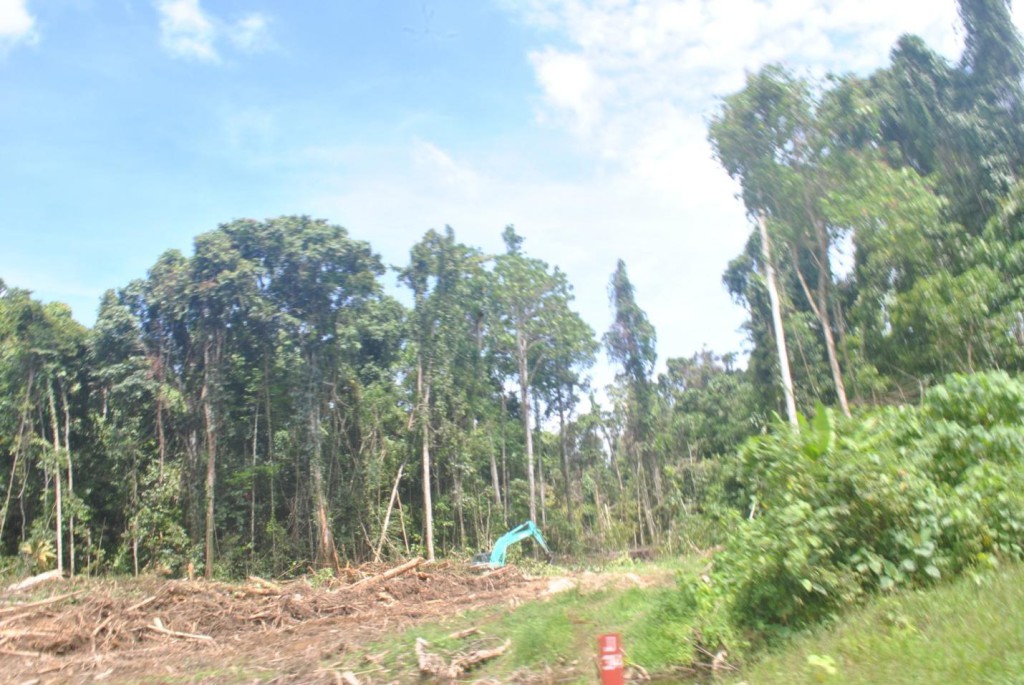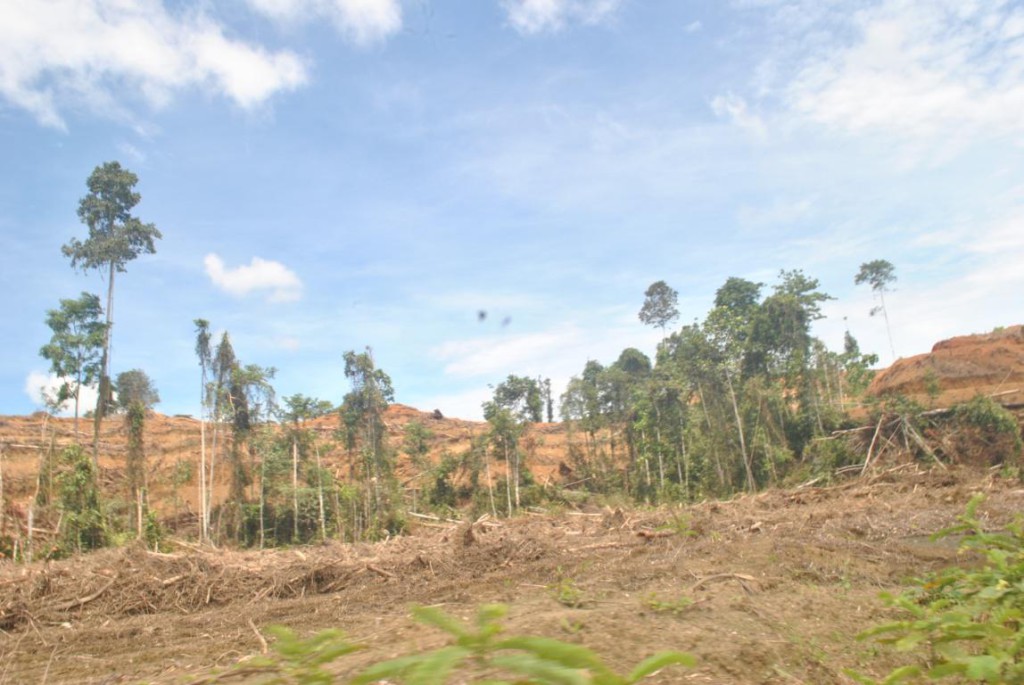(Sebuah Potret Perusahan Sawit di Kampung Wami dan Sima di Nabire)
(By Santon Tekege)
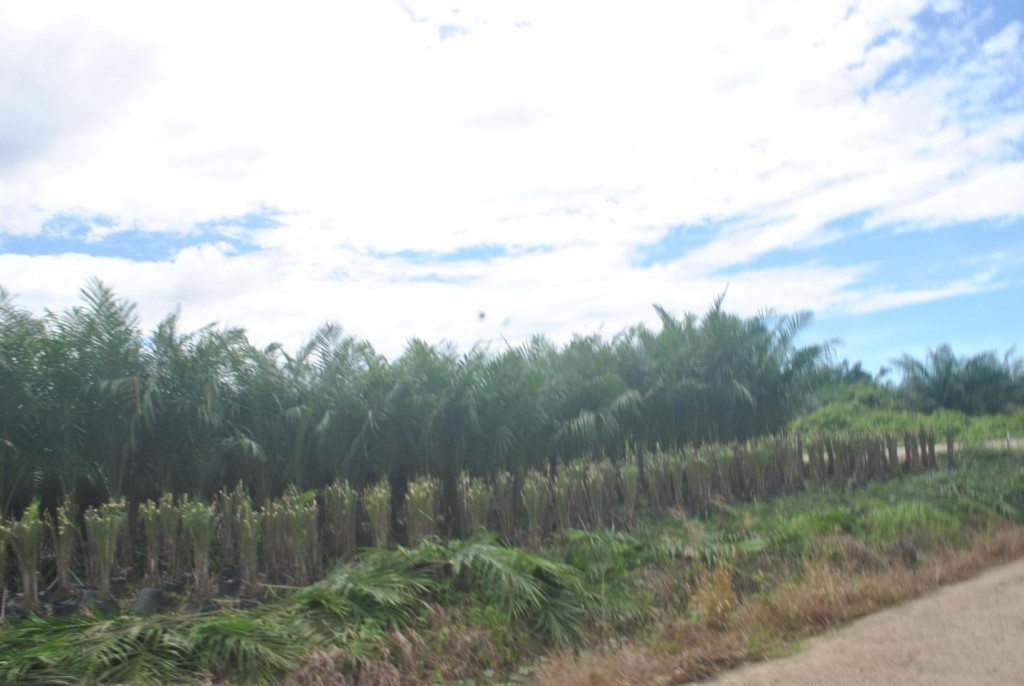 Maraknya kehancuran hutan terjadi demi kepentingan dan keuntungan Perusahaan dan Pemerintah Propinsi dan Kota/Kabupaten di tanah Papua. Hutan Papua menjadi sebuah incaran oleh para investor dunia di tanah Papua. Para investor memperlakukan hutan sebagai kenikmatan belaka. Hutan Papua diganti dengan lahan perkebunan kelapa sawit. Hutan Papua yang mengandung aneka ragam jenis flora dan fauna menjadi makanan sedap oleh pihak feodal dan Pemerintah Indonesia. Pemerintah Propinsi dan Kota/Kabupaten di tanah Papua tanpa menyadari orang Papua dengan hutannya memperbolehkan semua perusahan masuk di tanah Papua. Maka itu, pentingnya peniadaan segala perusahan termasuk perusahan kelapa sawit yang gencar di Papua khususnya perusahan sawit yang rencananya akan di buka di Kabupaten Nabire. Peniadaan perusahan agar orang asli Papua tidak mengalami hambatan dan putusnya relasi dengan alam di sekitarnya. Oleh karena itu, Pemerintah dan semua pihak termasuk Gereja pentingnya untuk keprihatinan tentang maraknya kerusakan hutan di tanah Papua.
Maraknya kehancuran hutan terjadi demi kepentingan dan keuntungan Perusahaan dan Pemerintah Propinsi dan Kota/Kabupaten di tanah Papua. Hutan Papua menjadi sebuah incaran oleh para investor dunia di tanah Papua. Para investor memperlakukan hutan sebagai kenikmatan belaka. Hutan Papua diganti dengan lahan perkebunan kelapa sawit. Hutan Papua yang mengandung aneka ragam jenis flora dan fauna menjadi makanan sedap oleh pihak feodal dan Pemerintah Indonesia. Pemerintah Propinsi dan Kota/Kabupaten di tanah Papua tanpa menyadari orang Papua dengan hutannya memperbolehkan semua perusahan masuk di tanah Papua. Maka itu, pentingnya peniadaan segala perusahan termasuk perusahan kelapa sawit yang gencar di Papua khususnya perusahan sawit yang rencananya akan di buka di Kabupaten Nabire. Peniadaan perusahan agar orang asli Papua tidak mengalami hambatan dan putusnya relasi dengan alam di sekitarnya. Oleh karena itu, Pemerintah dan semua pihak termasuk Gereja pentingnya untuk keprihatinan tentang maraknya kerusakan hutan di tanah Papua.
Orang Papua Dengan Hutannya
Orang Papua sebagai masyarakat peramu dan petani ladang memanfaatkan kekayaan alam sebagai sumber matapencaharian. Mereka (orang pesisir pantai maupun gunung) mengambil langsung makanan dari alam, sagu, ubi/petatas (nota), ikan, binatang buruan berupa rusa, kanggru, babi hutan, kuskus, dan berbagai jenis sayuran. Situasi ini secara perlahan berubah, orang Papua mulai mengalami kesulitan mencari sagu dan binatang buruan karena banyak hutan telah dibabat.
Umumnya orang Papua memiliki ikatan yang kuat dengan alamnya. Segala hal yang ada di hutan selalu dilihat sebagai bagian integral hidup manusia. Itulah sebabnya orang Papua sangat menghargai hutan dan segala isinya. Hutan dilihat sebagai tempat tinggal para leluhur. Apabila hutan dihancurkan, maka eksistensi orang Papua dengan hutan/alam akan retak. Karenanya, ketika orang membabat hutan dapat diartikan sebagai upaya melemahkan hubungan orang Papua dengan hutan dan lingkungan alam. Orang Papua yang memiliki kedekatan dengan alam dapat mengalami bahwa mereka berada dalam situasi dilematis. Hutan mereka habis dibongkar, akibatnya tempat mencari makan, berburu dan sumber air bersih hilang. Sementara itu, mereka tidak mendapatkan keuntungan dari perkebunan kelapa sawit.
Para investor sedang berpikir Hutan Papua akan diganti dengan tanaman kelapa sawit. Dalam berbagai propaganda, perusahaan menjanjikan hal yang muluk kepada masyarakat pemilik hak ulayat bahwa mereka akan menerima plasma lahan sawit. Perusahaan akan memperhatikan pendidikan, dan kesehatan bahkan menjamin ekonomi untuk peningkatan kesejahteraan masyarakat setempat. Seperti Perusahan Kelapa Sawit di kampung Wami dan Yaro Nabire. Padahal realitanya menunjukkan justru masyarakat asli semakin menderita bahkan paling miskin menurut data BPS Pusat 2010 di Indonesia. Kedua Propinsi paling Timur Indonesia (Papua 37,53% dan Papua Barat 35,71%) memperlihatkan data kemiskinan secara nasional paling bawa sementara sumber alam dapat melimpah di Papua. Di sini Pemerintah perlu melihat letak kesalahannya di mana? Atau apakah kebijakan Pemerintah yang salah sehingga dapat merugikan masyarakat setempat di Papua?
Peniadaan Kelapa Sawit di Papua
Disini dibutuhkan kebijakan dalam mengelola dan memanfaatkan sumber daya alam secara seimbang atau diperuntukkan bagi warga Papua. Jika dibuat demikian, maka peningkatan kesejahteraan ekonomi rakyat dapat terjadi pula. Peningkatan kesejahteraan ekonomi tidak harus mengganti hutan dengan perkebunan kelapa sawit. Masih ada banyak peluang usaha yang bisa menyejahterakan orang Papua. Tidak etis, kita mengorbankan hutan yang memiliki nilai hakiki untuk hal-hal yang bersifat instan dan sesaat. Kita perlu mengetahui bahwa orang Papua sebagai manusia yang menyatu dengan alam sehingga harus dipertahankan dan diwariskan kepada generasi mendatang. Bukan menghancurkan hutan dan segala binatang atau obat-obatan tradisonal tetapi perlu diperhitungkan atau ditiadakan saja segala perusahan termasuk perusahan kelapa sawit yang ada di tanah Papua pada umumnya dan Nabire pada khususnya.
Kehadiran perusahaan perkebunan kelapa sawit yang akan membuka lahan hutan misalnya oleh PT. Nabire Baru di Wami Distrik Yaur dan Distrik Sima, Kabupaten Nabire-Papua. Perusahan itu akan berencana membuka 32 ribu hektar menurut masyarakat setempat di Wami Nabire. Juga di kampung Sima sekitar 8000 ribu hektare. Sementara Pastor Dekan Teluk Cenderawasih Nabire mengatakan bahwa Perusahan akan membuka lahan hutan 17 ribu hektar di antara kampung Wami dan Yaro. Pemerintah Kabupaten Nabire telah mengeluarkan surat ijin kepada PT. Nabire Baru untuk membuka Perusahan Kelapa Sawit dalam rangka pemberdayaan ekonomi rakyat di Nabire. Pemerintah berkeyakinan bahwa dengan kehadiran PT. Nabire Baru di Wami dan Sima itu dapat mensejahterakan ekonomi masyarakat baik orang asli setempat maupun orang non Papua di Nabire. Pemerintah tanpa mempertimbangkan pelestarian hutan dan perlindungan pohon bahkan segala binatang lalu memberi ijin kepada Perusahan tersebut. Apabila konversi hutan Papua khususnya Nabire dengan dipaksakan melalui perkebunan kelapa sawit, maka akan terjadi kerusakan ekosistem hutan dan segala binatang yang hidup di kampung Wami dan Yaro Nabire. Pemakaian pestisida, dan limbah domestik berakibat pada penurunan daya penarikan lingkungan alami. Oleh karena itu, pentingnya untuk peniadaan Perusahan Kelapa Sawit di Kampung Wami dan Sima di Kabupaten Nabire-Papua.
Kita sudah mencermati dengan berbagai pengalaman yang berkaitan dengan perusahan kelapa sawit di Papua. Realita dapat menunjukkan bahwa perkebunan kelapa sawit tidak pernah mensejahterakan orang Papua, tetapi mengapa lahan perkebunan kelapa sawit hendak dibuka terus di Papua khususnya di Nabire? Perkebunan kelapa sawit justru mendatangkan permasalahan baru di tengah orang Papua karena mereka akan kehilangan berbagai sumber makanan, tanaman obat-obatan pun musnah serta tempat-tempat keramat hilang. Mungkin peluang bagi para pekerja imigran dari luar Papua. Cara demikian itu, akan menambah penduduk baru sementara penduduk yang lama miskin dan tidak sejahtera ekonominya. Siapakah yang mempunyai kepentingan di balik pembukaan lahan perkebunan kelapa sawit di Papua khususnya di Kabupaten Nabire? Papua dikuasai oleh para investor asing dan berdampak ruginya pada hutan dan rakyat kecil. Rakyat kecil akan kehilangan lapangan pekerjaan sebagai petani karena tidak mampu bersaing dengan para pemodal bahkan tidak dipekerjakan dengan cara modernisme. Sementara orang Papua hidupnya langsung dari alam. Letak penyesuaian dengan cara-cara modern ini sangat lama bagi orang asli Papua. Karena Pemerintah setempat tidak membekali dengan pelatihan-pelatihan bagi orang asli Papua. Maka orang setempat dianggap bodoh dan tidak memiliki ketrampilan sehingga segala perusahan termasuk kelapa sawit sangat gampang mendatangkan imigran-imigran dari luar Papua untuk dipekerjakan sebagai tenaga pekerja atau buruh kerja di perusahan tersebut.
Pelestarian hutan Papua harus ditempatkan dalam kerangka menyelamatkan manusia Papua. Hutan Papua tidak dilihat sebagai hutan pada dirinya, melainkan memiliki korelasi dengan identitas orang Papua. Dengan berpikir demikian, hutan tidak lagi dilihat sebagai obyek eksploitasi melainkan bagian integral manusia Papua yang harus dilindungi dan dilestarikan.
Sebuah Potret Kelapa Sawit Bagi Orang Asli Di Nabire
Kaum lemah dan miskin di Papua akan kehilangan lahan dan tanahnya. Mereka akan kehilangan obat-obatan tradisional dan tempat-tempat sakral. Penghayatan orang asli Papua tentang komunitas lain akan dihancurkan oleh perusahan yang telah dan akan hadir di Papua. Komunitas-komunitas itu antara lain komunitas orang yang hidup dan yang mati (arwah). Komunitas lain adalah air sungai dan danau, pohon, rumput, dan segala tambang yang ada di Papua.
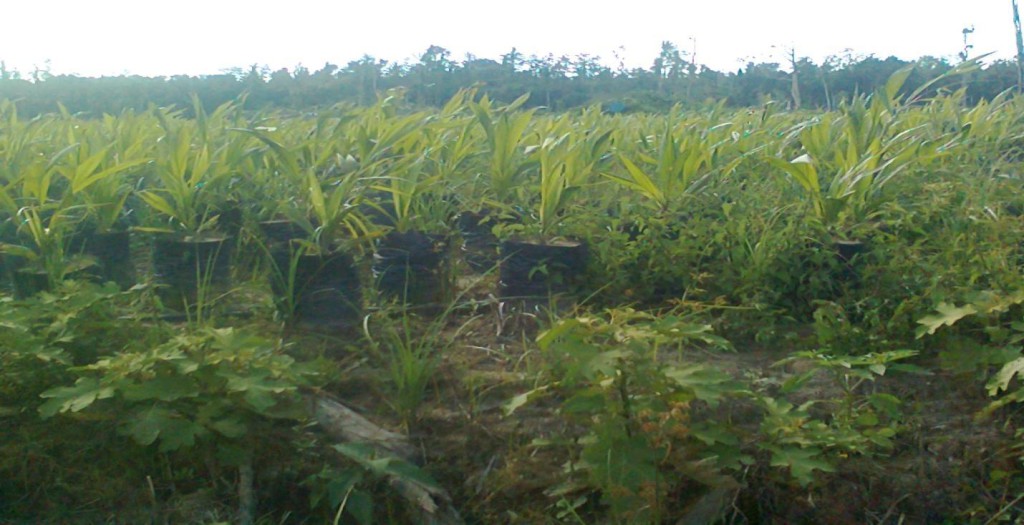
Ketika Perusahan dapat menghancurkan berbagai komunitas ini, maka orang asli Papua akan mengalami krisis komunitas dan relasinya akan mengalami kekhaosan. Jika penghayatan orang asli Papua tentang alam dan komunitas dihancurkan, maka orang asli akan mengalami krisis diri sendiri, musibah banjir dan kelaparan bahkan kematian meningkat. Dengan tegas mengatakan bahwa jika perusahan hendak mau hadir di Papua, maka segala pembiayaan harus dibiayai oleh perusahan hingga puluhan generasi ke depan. Jika tidak mampu membayar, maka perusahan jangan hadir di bumi Papua. Oleh karena itu, hentikan segala penghancuran dan pembabatan hutan. Karena berlawanan dengan penghayatan akan alam dan komunitas yang ada di Papua.
Sebuah potret dapat memperlihatkan tentang fenomena marak terjadinya kerusakan hutan dan lingkungan di Nabire, nilai kedamaian dan keadilan bahkan hidup saudara pun semakin pudar dari wajah orang asli Papua. Di sini ditantang bahwa perusahan apa saja yang hendak hadir di Papua, perlunya menghormati orang asli beserta penghayatan mereka. Jika Perusahan menghargai hutan dan lingkungan, maka perlu menghormati dan menjunjung tinggi tempat keberadaan segala komunitas yang ada di kampung Wami dan Yaro . Maka dari itu, akan terjadi hidup damai dan adil bahkan harmonis di antara orang asli dengan komunitas hutan dan lingkungan yang ada di tanah Papua pada umumnya dan Nabire pada khususnya.
Letak Keterlibatan Gereja di Papua
Dasar keterlibatan dan keberpihakan dalam tantangan Pastoral di bumi Papua adalah terletak dalam Ensiklik Rerum Novarum (1891) dan Ensiklik Guadragessimo Anno (1931) berbicara tentang keberpihakan sosial Gereja terhadap kaum buruh dan miskin bahkan masalah-masalah sosial sebagai pelayanan pastoral sosial gereja. Dalam dokumen Konsili Vatikan ke-II secara tegas memberikan pandangan teologis sosial untuk keterlibatan gereja yang menyeluruh tak lagi terbatas kelas buruh dan persoalannya. Tetapi lebih pada hubungan antara gereja dan dunia. Dalam refleksi ini, gereja memberikan pandangan teologis terhadap komitmen politisnya sehingga bagian utuh dan keterlibatan dan keberpihakan gereja terhadap kehidupan sosial.
Gereja pada dasarnya menolak segala bentuk penindasan bagi manusia. Gereja menolak dengan tegas gila akan kekuasaan politis melebihi kekuasaan Allah. Atas dasar refleksi ini, Gereja selalu terlibat dalam menyuarakan nilai-nilai kemanusiaan di Indonesia pada umumnya dan Papua pada khsusnya. Keterlibatan dan keberpihakan gereja terhadap kehidupan manusia ditegaskan kembali dalam Gaudium Et Spes art.1 yang berbunyi: “Kegembiraan dan harapan, duka dan kecemasan manusia dewasa ini, terutama yang miskin dan terlantar adlah kegembiraan dan harapan, duka dan kecemasan bersama sebagai anak-anak Allah pula”. Akhirnya, dokumen-dokumen gereja ini menjadi titik pijak keterlibatan dan keberpihakan kita dalam berbagai persoalan sosial di Indonesia pada umumnya dan Papua khususnya demi keselamatan dan pembebasan bagi umat manusia dan alam ciptaan di dunia ini. Untuk menggapai tujuan ini, saatnya kita membuka diri untuk keterlibatan dan keberpihakan kita dalam menjawab tantangan di bumi Papua. Jadi, isu maraknya penggalangan rusaknya hutan dan lingkungan menjadi keprihatinan dan kepedulian bersama di bumi Papua.
Penulis: Petugas Pastoral Keuskupan Timika-Papua.
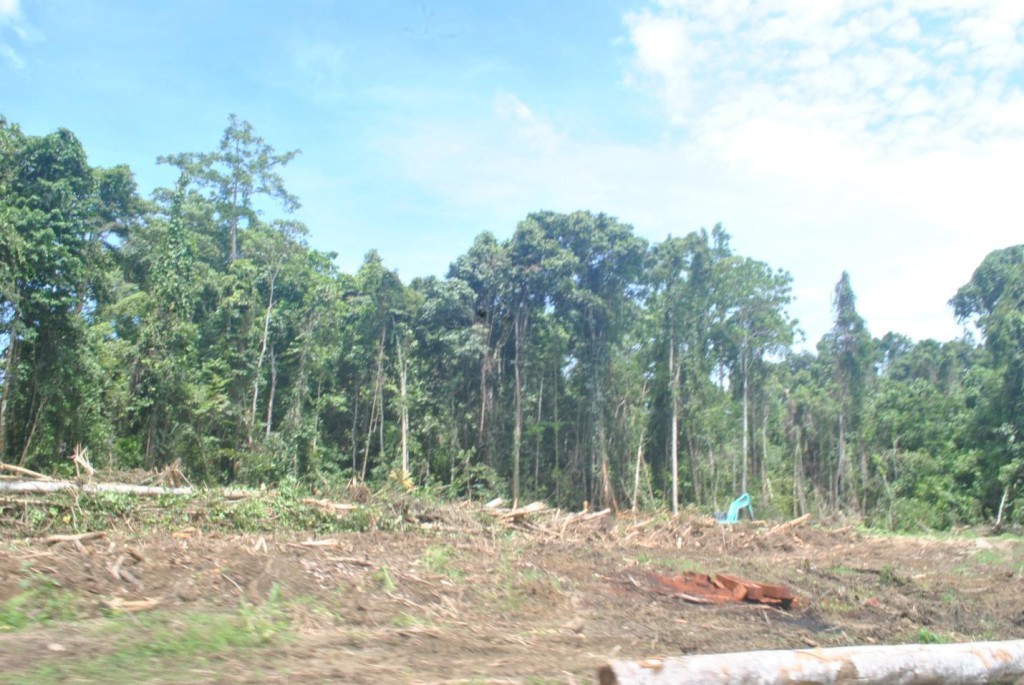 Foto: Hutan pepohonan sedang hancurkan. Kayu-kayu Besi menjadi makanan perusahan PT Nabire Baru
Foto: Hutan pepohonan sedang hancurkan. Kayu-kayu Besi menjadi makanan perusahan PT Nabire Baru
Alat berat Doser menghancurkan hutan sakral bagi suku Yerisiam di kampung Wami dan Sima.
Ribuan hutan dan berbagai perbukitan dihancurkan demi perusahan kelapa sawit oleh PT Nabire Baru di Kampung Wami dan Sima Distrik Yaur Kabupaten Nabire Papua
[catatan awasmifee: PT Nabire Baru adalah anak perusahaan Carson Cumberbatch dari Sri Lanka melalui divisi perkebunannnya Goodhope Company. Anak perusahaan lain diduga terlibat di Nabire adalah PT Sariwana Unggal Mandiri dan PT Sariwana Adi Perkasa]

